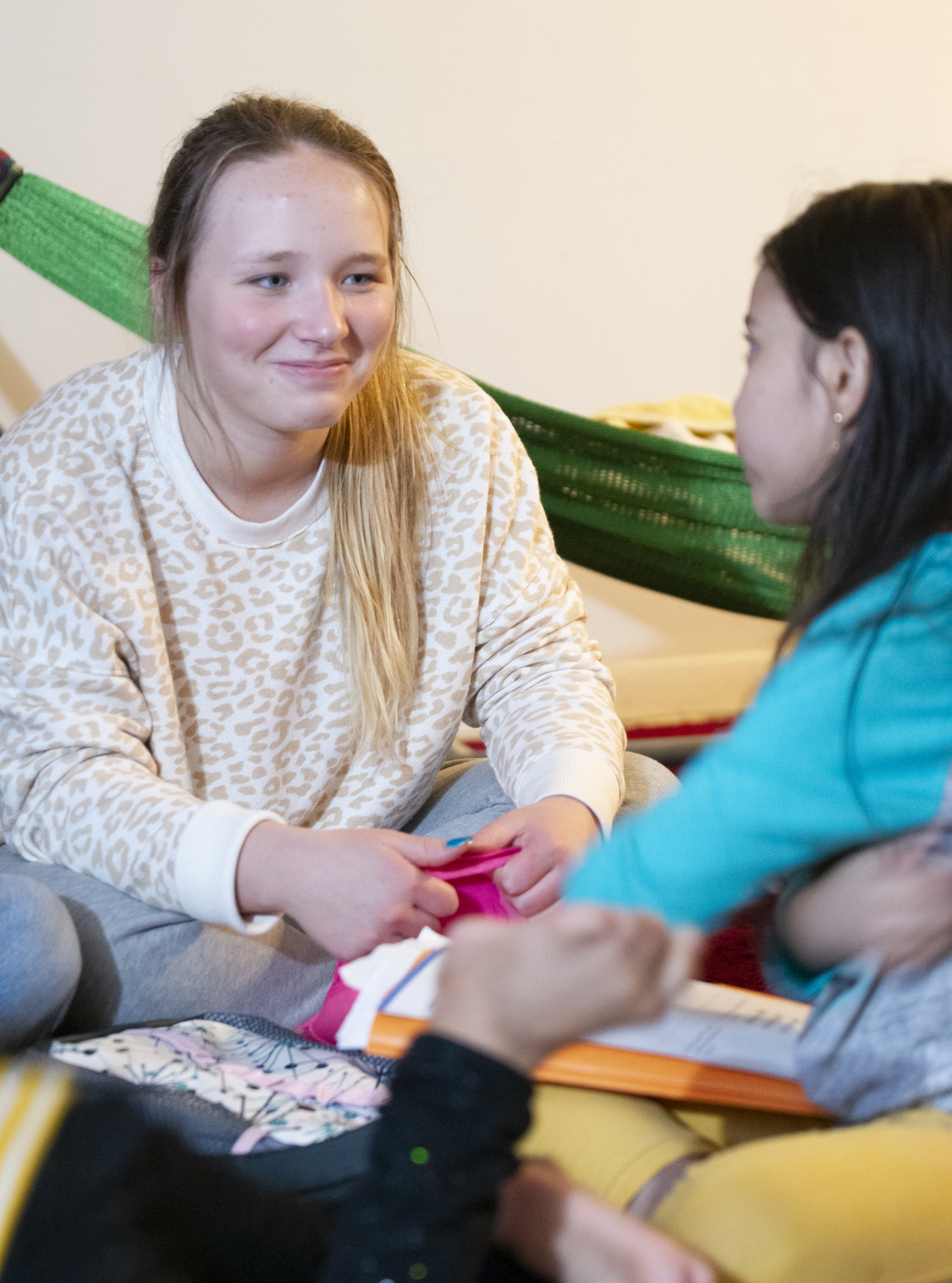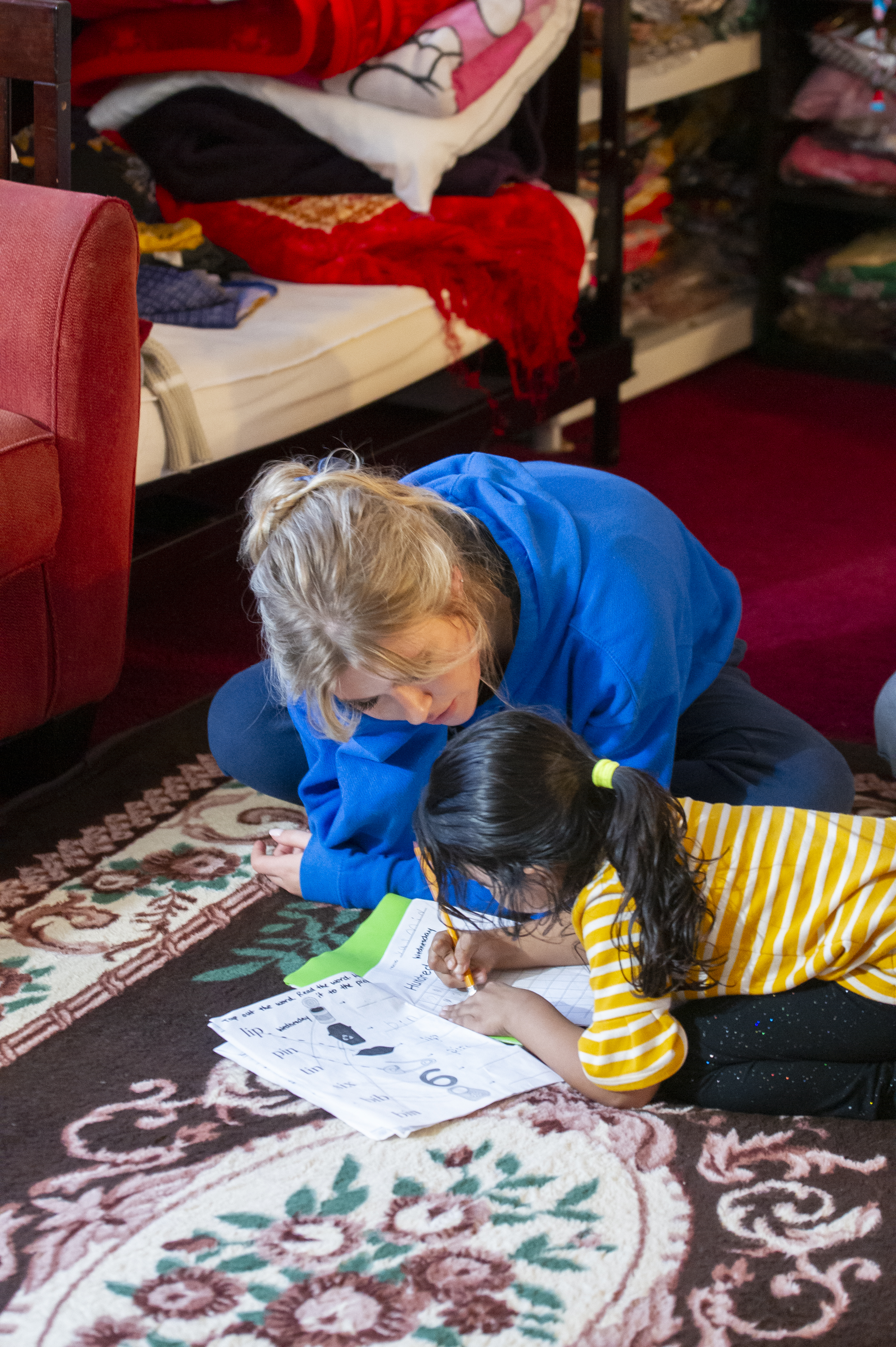About the Author
Linda Piepenbrink is a senior editor in Marketing Communications and the managing editor of Alumni & Friends magazine with Moody Bible Institute.
This site uses cookies to provide you with more responsive and personalized service and to collect certain information about your use of the site. You can change your cookie settings through your browser. If you continue without changing your settings, you agree to our use of cookies. See our Privacy Policy for more information.

Aaliyah helps a child from Myanmar with her homework while serving in Moody's Practical Christian Ministry with Devon Oasis in Chicago's Little India neighborhood. This is the first in a series of posts on how Moody Bible Institute's PCMs are serving refugees from dozens of countries in Little India. Photo by Lawrence Bohlin
by Linda Piepenbrink
On a cold, drizzly Thursday evening in Chicago’s Little India, Moody Bible Institute students Aaliyah Feaster, Rachel Wilson and Clara Vander Hoven climb three flights of stairs bringing boxes of diapers and good cheer to Burmese refugee families in the apartment building. Mohammed and Nur Jahenbi, Rohingya Muslims who settled here after fleeing persecution in Myanmar, thank them for the gifts, compliments of the local Christian charity Devon Oasis, and invite the young ladies inside.
“Are the kids here?” asks Vander Hoven, dropping her shoes at the door and sitting down on the carpet with the other Moody students.
Suddenly two Rohingya moms appear in the doorway as six young refugee children race past them to join their tutors on the floor. Six-year-old Yasmin excitedly jumps into Vander Hoven’s arms, knocking her over. The living room erupts with chatter and laughter. Aaliyah admires one child’s picture of a unicorn. Wilson asks another child, “Did you go to school today? How was it?” Yasmin boasts that she can count to 100—“21, 22, 23 . . . 29”—then collapses into giggles.
For the next two hours, the Moody students play with the children, help them with homework, and share Bible stories. Despite an hourlong commute on the CTA, the students look forward to their weekly visit with the refugee kids. “It’s fun; it’s a growing experience,” says Vander Hoven, a freshman majoring in ministry to victims of sexual exploitation. “It’s just cool to build relationships with families and be able to pour into the kids’ lives. I love it.”
The visit also serves another purpose, fulfilling a weekly Practical Christian Ministry (PCM) requirement at Moody. PCMs have long been a part of every student’s training at Moody, taking what they’ve learned in the classroom and applying it in the community.
Practical Christian Ministries: meeting needs
Moody Bible Institute offers 300 options for PCM assignments, ranging from homeless shelters and rescue missions to English-language teaching and kids’ Bible clubs. Several PCM opportunities attract students to Little India, the 15-block strip of Devon Avenue stretching west from Damen Avenue to California Avenue. The area is lined with ethnic grocery stores, Indian restaurants, dress shops, home décor and mosques and temples.
The diverse South Asian community and commercial district on Chicago’s North Side has seen a large influx of refugees, predominantly Afghan evacuees but also families and individuals from Iraq, Uganda, Myanmar and Sudan.
“In 36 years, I’ve met people from over 135 nations—in one neighborhood,” says Dr. Bob Andrews, who earned his master of divinity degree from Moody Theological Seminary in Chicago in 2004. Andrews founded Devon Oasis with his wife, Lynne, in 1986. Devon Oasis features more than 50 Moody students each semester serving this community of refugees.
“We’re Christian and we share Jesus Christ unashamedly, but we address people’s felt needs,” Andrews says. “We welcome new refugee families; they come with no toothpaste, no soap, no shampoo, no blankets for their bed. We buy them food. We provide material goods for these precious people.
“The No. 1 need of all refugees is friendship. When they come to America, they need a friend more than they need rice almost. They’re so lonely. Some lost their husbands, like the ones from Afghanistan; their husbands were killed by the Taliban, and they need friends. The first thing we do is affirm people. We do preach Christ but we’re their friend, and we help them get settled in this new world.”
Because five resettlement agencies are located in Rogers Park and Albany Park, many immigrants and refugees end up staying in the area. This densely populated community offers great opportunities for Moody students and alumni to be good neighbors. “God has gathered the world on this one-mile strip,” says Bonnie Hill, a junior majoring in missional leadership and nonprofit management at Moody. “It is really beautiful; the culture is so rich, and there are so many things to learn from the people here. They’re so wonderful.”
Photo caption: Clara, a freshman at Moody, tutors a child during a PCM session through Devon Oasis in the Little India neighborhood. Photo by Lawrence Bohlin
Linda Piepenbrink is a senior editor in Marketing Communications and the managing editor of Alumni & Friends magazine with Moody Bible Institute.